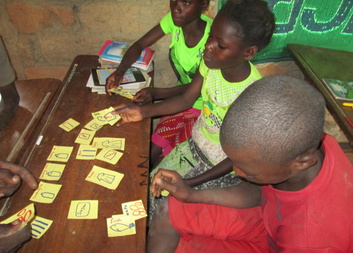That was one of the answers to the question, if and why the students of elemterary school in refugee camp in Meheba would like to become enterpreneurs.
Another answers were:
"Because if I am an entrepreneur, I'll be able to travel..."
"Business will allow me to make a living..."
"Because you need money every day..."
"I do not want to be a businesswoman, because I want to become a journalist..."
"Because it makes your life in future better..."
"I don’t, because I cannot count..."
Besides supporting young people in vocational fields, which you can read more about in the article, The School year in Solwezi, Caritas Czech Republic (CCR) presented the Meheby program to young people in business education in Zambian schools. CCR wants to introduce children to the topic of business and explain to them that entrepreneurship is one of the ways they can take care of themselves and their families in the future.
year in Solwezi, Caritas Czech Republic (CCR) presented the Meheby program to young people in business education in Zambian schools. CCR wants to introduce children to the topic of business and explain to them that entrepreneurship is one of the ways they can take care of themselves and their families in the future.
Often, from an early age, children in the Czech Republic are taught how to save money, how to properly use money, and how to assess whether there is something beneficial in it. Then, in adulthood, they are able to calculate the cost, profit and loss, which forms the basis of a successful business. In contrast, children in camp Meheba learn how to farm the fields, how to cook lunch on charcoal or take care of siblings. Therefore such calculations are not what they are used to in the camp and randomly established business initiatives often face many problems.
And as with all changes, it is the best to start with chidren. Therefore, CCR has organized five classes on the fundamentals of business in three different elementary schools. 121 pupils and students from third, fourth, eighth and ninth grades participated in this non-traditional class.
Caritas CR staff presented the topic of business in a fun way. Mr. James Malala, entrepreneurship trainer, set up a game where children played the marketers, small business owners and wholesalers. Within an hour and a half children practised making a profit, saving money or keeping business records. In addition, Mr. Malala played banker, and helped children discover the bank’s features and potential benefits for entrepreneurs.
The game was a great success among both children and teachers, who demanded more hours of entrepreneurship courses for their students. Although these are hours included in the school curriculum, schools have no capacity to profit from it to the fullest.
have no capacity to profit from it to the fullest.
CCR plans to continue next year raising awareness of business programs and promote more hours of business classes that and business activities children expressed their interest in already this year. The same program took place with good success at schools in Mayukwayukwa refugee camp in the Western Province of Zambia.
The program at the school in Meheba in Zambia took place as a charity project to support local integration of Angolan refugees, and was funded by the Office of the High Commissioner for Refugees that UN CCR launched in July 2014. The project also cooperated with Czech non-profit organization Njovu o.p.s.







